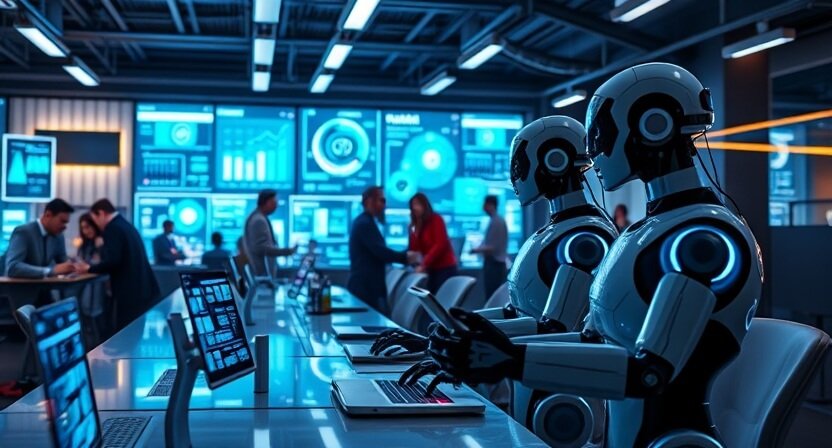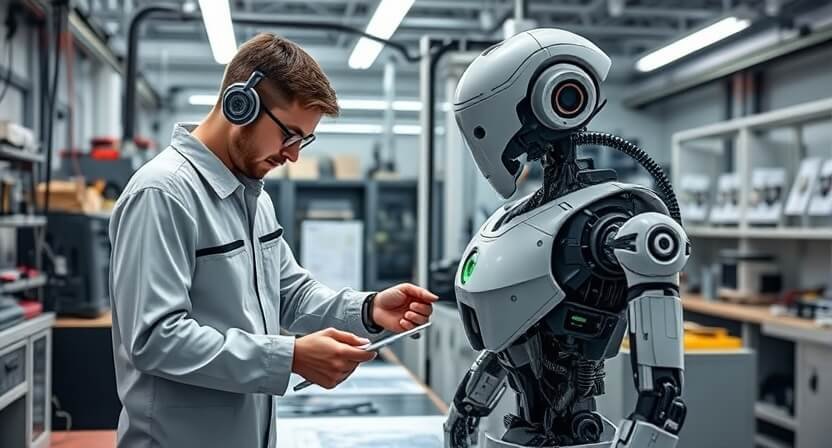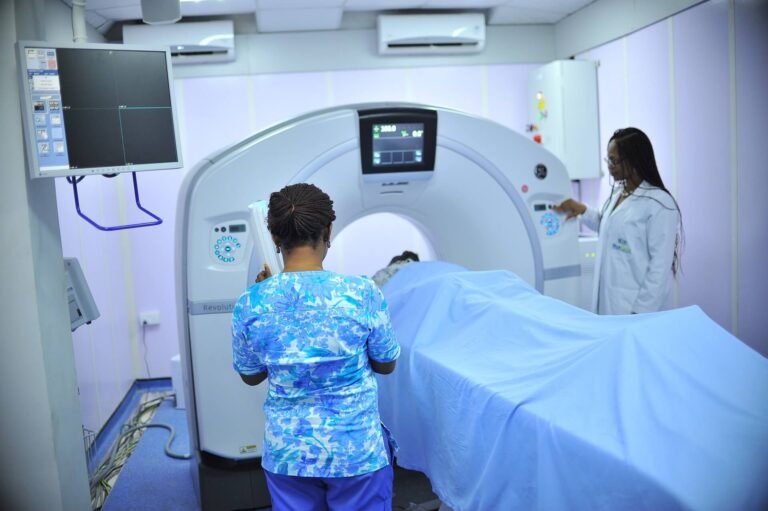
The Future of Work: How Automation and AI Are Redefining Jobs
Automation and artificial intelligence (AI) are reshaping industries at an unprecedented pace. These technologies, once the realm of science fiction, now play a pivotal role in businesses, healthcare, manufacturing, and beyond. But with this transformation comes uncertainty. Will jobs disappear? How do we adapt? This article explores how AI and automation are redefining work, the opportunities and challenges they bring, and what this means for workers and businesses in the United States.
What Are Automation and AI?
Automation involves machines and software performing tasks with little or no human intervention. Examples include robotic arms assembling products or software automating repetitive data entry.
Artificial Intelligence (AI) takes this a step further. AI enables machines to simulate human intelligence—learning from data, recognizing patterns, and making decisions. Think of virtual assistants like Siri or chatbots answering customer queries.
These technologies are not just tools—they’re changing the nature of work itself.
The Impact of Automation and AI on Jobs
The effects of AI and automation are deeply emotional, sparking hope for innovation and fears of job displacement.
The Positive Side
- Increased Efficiency: Automation eliminates tedious tasks, freeing workers to focus on creative and strategic roles.
- New Job Creation: AI creates demand for new roles, such as data scientists, AI trainers, and cybersecurity experts.
- Higher Productivity: Businesses become more competitive, potentially driving economic growth.
The Challenges
- Job Displacement: Routine tasks are increasingly automated, leading to job losses in certain sectors.
- Skill Gaps: Workers need to reskill to stay relevant in an AI-driven world.
- Economic Inequality: Not everyone has equal access to the resources needed to adapt, creating a growing divide.
Industries Most Affected by Automation and AI

1. Manufacturing
The introduction of “smart factories” has streamlined production, but it has also replaced many traditional factory jobs. Advanced robots now assemble, test, and package products faster than humans.
2. Healthcare
AI-powered tools analyze medical scans, diagnose diseases, and even assist in surgeries. While these advancements improve patient outcomes, they also redefine the roles of healthcare professionals.
3. Retail
Self-checkout kiosks, AI-driven supply chains, and personalized shopping experiences are becoming the norm. Jobs like cashiers are declining, but roles in data management and customer experience design are expanding.
4. Transportation
Autonomous vehicles and drones promise to revolutionize logistics. While drivers may face job losses, new opportunities in vehicle programming, maintenance, and AI oversight are emerging.
5. Finance
AI streamlines processes like loan approvals and fraud detection, reducing the need for traditional roles like tellers but increasing demand for roles in cybersecurity and data analytics.
The Jobs of the Future: Adapting to Change
1. AI Trainers
AI systems rely on humans to teach them how to process and interpret data effectively.
2. Data Analysts and Scientists
As businesses collect vast amounts of data, professionals are needed to interpret it and make actionable decisions.
3. Human-AI Collaboration Specialists
These roles ensure that humans and machines work together effectively, blending technical and interpersonal skills.
4. Cybersecurity Experts
As automation grows, so do cyber threats. Professionals who can secure systems will be in high demand.
5. Creative Roles Enhanced by AI
AI can assist in tasks like content creation, leaving humans to focus on creativity and innovation.
How to Thrive in an AI-Driven World
The key to staying ahead in the age of AI and automation lies in adaptability.
1. Embrace Lifelong Learning
The rapid pace of technological advancement requires continuous skill development. Online courses, workshops, and certifications can help you stay current.
2. Develop Soft Skills
Machines excel at logic but lack emotional intelligence, creativity, and interpersonal skills—areas where humans have an edge.
3. Stay Tech-Savvy
Learn basic programming, data analysis, or AI fundamentals to better understand and utilize these technologies.
4. Network and Collaborate
Building relationships across industries can open doors to new opportunities in emerging fields.
5. Focus on Resilience
The ability to adapt to change is critical. Stay open to new roles and embrace challenges as opportunities for growth.
What Businesses Can Do to Support Workers
To ease the transition, companies must invest in their workforce:
- Upskilling Programs: Provide training opportunities to equip employees with future-ready skills.
- Transparent Communication: Keep workers informed about how automation will impact their roles.
- Create Hybrid Roles: Blend human strengths with AI capabilities, redefining job descriptions to include both.
Businesses that prioritize their employees’ development will thrive in this new landscape.
Overcoming the Emotional Hurdles of Automation

It’s natural to feel anxious about the changes AI and automation bring. But with change comes opportunity. Imagine a future where:
- Repetitive, mundane tasks are a thing of the past.
- Your workdays are focused on creativity, problem-solving, and meaningful contributions.
- You’re constantly learning and growing, staying ahead in your career.
Instead of fearing automation, view it as a tool to enhance your potential.
FAQs: Your Questions About Automation and AI Answered
Will AI take all our jobs?
No. While some jobs will disappear, others will emerge. The focus should be on reskilling and adapting.
What industries are most at risk?
Industries with repetitive tasks, such as manufacturing and retail, are more susceptible to automation. However, these sectors will also create new roles in AI oversight and technology management.
How do I prepare for the future of work?
Focus on learning new skills, especially in technology, data analysis, and communication. Stay curious and adaptable.
A Future of Possibilities
The rise of automation and AI doesn’t spell the end of jobs—it signals the beginning of a new era. By embracing change, acquiring new skills, and focusing on roles that enhance human creativity and decision-making, you can thrive in the workforce of tomorrow.
Let’s not fear the future but face it with confidence, armed with the tools and mindset to succeed. The power to adapt and grow lies within us all.
Conclusion: Embrace the Future With Confidence
The future of work, driven by automation and AI, isn’t a story of machines replacing humans—it’s a story of transformation. This revolution challenges us to grow, adapt, and redefine our roles in ways we never imagined. Yes, there will be disruptions, but there will also be incredible opportunities for those willing to learn, evolve, and think creatively.
Imagine a career where you’re no longer bogged down by repetitive tasks but instead focus on meaningful, impactful work. Visualize a world where technology enhances your potential rather than replacing it. The key to thriving in this new era lies in embracing lifelong learning, honing your unique human skills, and partnering with technology to achieve extraordinary results.
The future is here, and it’s brimming with possibilities. Will you seize the opportunity to grow and innovate?
Summary: What You Need to Know About the Future of Work
- Automation and AI are revolutionizing industries, streamlining processes, and creating smarter workplaces.
- While some jobs may vanish, new opportunities will arise in fields like data science, cybersecurity, AI training, and human-AI collaboration.
- Industries like manufacturing, healthcare, retail, transportation, and finance are seeing the greatest impact—but also the most growth potential.
- To thrive, focus on upskilling, developing soft skills, and embracing lifelong learning.
- Businesses must play their part by supporting employees with transparent communication, training programs, and innovative role designs.
The journey into the future of work is both exciting and challenging. Are you ready to embrace the changes, unlock your potential, and build a career that thrives in the age of AI? The choice is yours—step forward confidently, and let the future inspire you!
FREQUENTLY ASKED QUESTIONS (FAQs)
1. Will AI and automation really replace my job?
Great question, and one that’s on everyone’s mind! While automation may replace some repetitive tasks, it’s more about changing the nature of jobs than eliminating them entirely. Think of it this way: as some doors close, new ones open. Focus on skills that AI can’t replicate, like creativity, emotional intelligence, and strategic thinking.
2. How can I future-proof my career in this fast-changing world?
It’s all about staying ahead of the curve. Commit to lifelong learning—whether that’s taking online courses, attending workshops, or exploring new fields. Keep developing human-centric skills like leadership, adaptability, and problem-solving. The future belongs to those who evolve with it!
3. What industries are the most affected by automation? Should I avoid working in them?
Automation is transforming industries like manufacturing, healthcare, retail, and transportation. But instead of avoiding them, think about where you can fit into the future version of these industries. For example, automation in healthcare creates demand for roles in AI system management and telemedicine. There’s plenty of opportunity if you’re proactive.
4. How can small businesses or employees benefit from AI instead of fearing it?
Small businesses can use AI to level the playing field—boosting efficiency, personalizing customer experiences, and cutting costs. Employees, on the other hand, can embrace AI as a tool to make their jobs easier and more impactful. It’s not about fighting against technology but partnering with it to grow.
5. What if I’m not tech-savvy? Can I still thrive in the future workforce?
Absolutely! While understanding technology is helpful, success in the future workforce isn’t limited to coders or engineers. Soft skills like empathy, communication, and creativity will always be in demand. Plus, there are countless beginner-friendly resources to help you learn the tech basics at your own pace.
6. Is it too late for me to reskill or change my career path?
Never! It’s never too late to learn something new or take your career in a different direction. With online resources, mentorship programs, and growing support for workforce development, there’s more help available than ever. Start small, stay consistent, and remember—it’s about progress, not perfection.
7. How does automation impact salaries and job security?
While automation can shift demand for certain roles, it also opens up high-paying opportunities in emerging fields like AI development, data science, and human-AI collaboration. Job security depends on your ability to adapt and stay ahead of trends. Think of this change as a chance to upgrade your skills and income potential.
8. What emotional challenges should I prepare for in this transition?
Change can be overwhelming, and fear of the unknown is natural. You might feel anxious about learning new skills or uncertain about your career’s future. But remember, every challenge is an opportunity to grow. Focus on what excites you about the future and take it one step at a time.
9. Can automation actually enhance my job instead of taking it away?
Absolutely! Automation often handles repetitive tasks, freeing you to focus on creative, strategic, and high-impact work. Imagine having more time to innovate, build relationships, and pursue ideas that truly matter to you.
10. How can I support others—like coworkers or employees—during this transition?
Encourage an open dialogue about changes, share resources for upskilling, and advocate for workplace training programs. The best way to thrive in this future is together, supporting and uplifting those around you.
11. What are some skills that AI can never replace?
AI is powerful, but it lacks the human touch. Skills like creativity, empathy, emotional intelligence, leadership, and complex problem-solving remain uniquely human. These abilities are your superpowers in an AI-driven world, so focus on honing them!
12. How can students prepare for the future job market?
Students should focus on STEM fields (science, technology, engineering, and math) while also developing soft skills like communication and teamwork. Internships in tech-forward industries and learning tools like coding or data analysis can provide an edge. Most importantly, embrace a mindset of curiosity and lifelong learning.
13. What’s the difference between jobs being “automated” and “augmented” by AI?
When a job is automated, machines fully take over repetitive tasks. However, when a job is augmented, AI works alongside humans to enhance productivity. For example, AI might handle data analysis, while you interpret and act on the results. Augmentation makes your role more efficient and impactful.
14. Is AI only for big corporations, or can smaller businesses benefit too?
AI is not just for giants like Google or Amazon! Today, there are affordable AI tools for small businesses, from chatbots for customer service to marketing automation platforms. These tools can help small businesses save time, cut costs, and compete more effectively.
15. How do I know which jobs are at risk of automation?
Jobs that involve repetitive, predictable tasks are most at risk. Examples include data entry clerks, assembly line workers, and cashiers. However, roles requiring creativity, emotional intelligence, and complex decision-making are far less likely to be automated.
16. Are there any ethical concerns about AI and automation in the workplace?
Yes, ethical concerns include data privacy, algorithm bias, and fairness in job displacement. It’s crucial for companies to adopt ethical AI practices, ensuring transparency and accountability in how these technologies are used. Workers can advocate for fair policies to address these challenges.
17. How do I balance emotional resilience while adapting to change?
Change is hard, but resilience comes from focusing on what you can control. Start small by learning a new skill or connecting with mentors who’ve navigated similar transitions. Stay positive by visualizing the future opportunities that AI and automation can bring to your career.
18. Are there resources for free or affordable upskilling?
Yes! Platforms like Coursera, Khan Academy, edX, and LinkedIn Learning offer free or low-cost courses in areas like AI, data analysis, and programming. Many universities and companies also provide online certifications for in-demand skills. The tools to upskill are more accessible than ever!
19. How is AI changing leadership and management roles?
AI is helping leaders make data-driven decisions by providing real-time insights. However, the role of a manager is still deeply human—fostering collaboration, empathy, and strategic vision. Leaders who embrace AI as a tool, rather than a threat, will excel in this new era.
20. Will automation lead to shorter workweeks and better work-life balance?
It’s possible! As automation boosts efficiency, some industries may reduce workloads to focus on employee well-being. While we’re not quite at the 4-day workweek for all, automation has the potential to shift the focus from quantity to quality of work.
21. What role does the government play in this transition?
Governments can help by investing in education, reskilling programs, and social safety nets to support displaced workers. Policies promoting ethical AI use and equitable access to opportunities are also crucial to ensure a fair transition for all.
22. Can automation help solve global challenges?
Yes! Automation and AI are already tackling climate change, healthcare shortages, and food distribution issues. For example, AI-powered farming tools optimize crop yields, while robots assist in disaster relief efforts. These technologies are not just transforming jobs—they’re reshaping the future of humanity.
23. What are the risks of not adapting to AI and automation?
Failing to adapt can lead to job displacement, skill obsolescence, and reduced career opportunities. Staying ahead of the curve by learning new technologies and embracing change is essential to thrive in a rapidly evolving world.
24. How can I identify AI-driven roles that match my interests?
Explore industries you’re passionate about and look for emerging job roles. For instance, if you love storytelling, AI-powered content creation might be for you. If you’re into problem-solving, data analysis or cybersecurity could be exciting paths.
25. What’s the emotional silver lining of this technological shift?
Though change is intimidating, it’s also empowering. This is a chance to redefine your career, focus on meaningful work, and unlock potential you never knew you had. The future is bright for those who embrace it with courage and curiosity.



